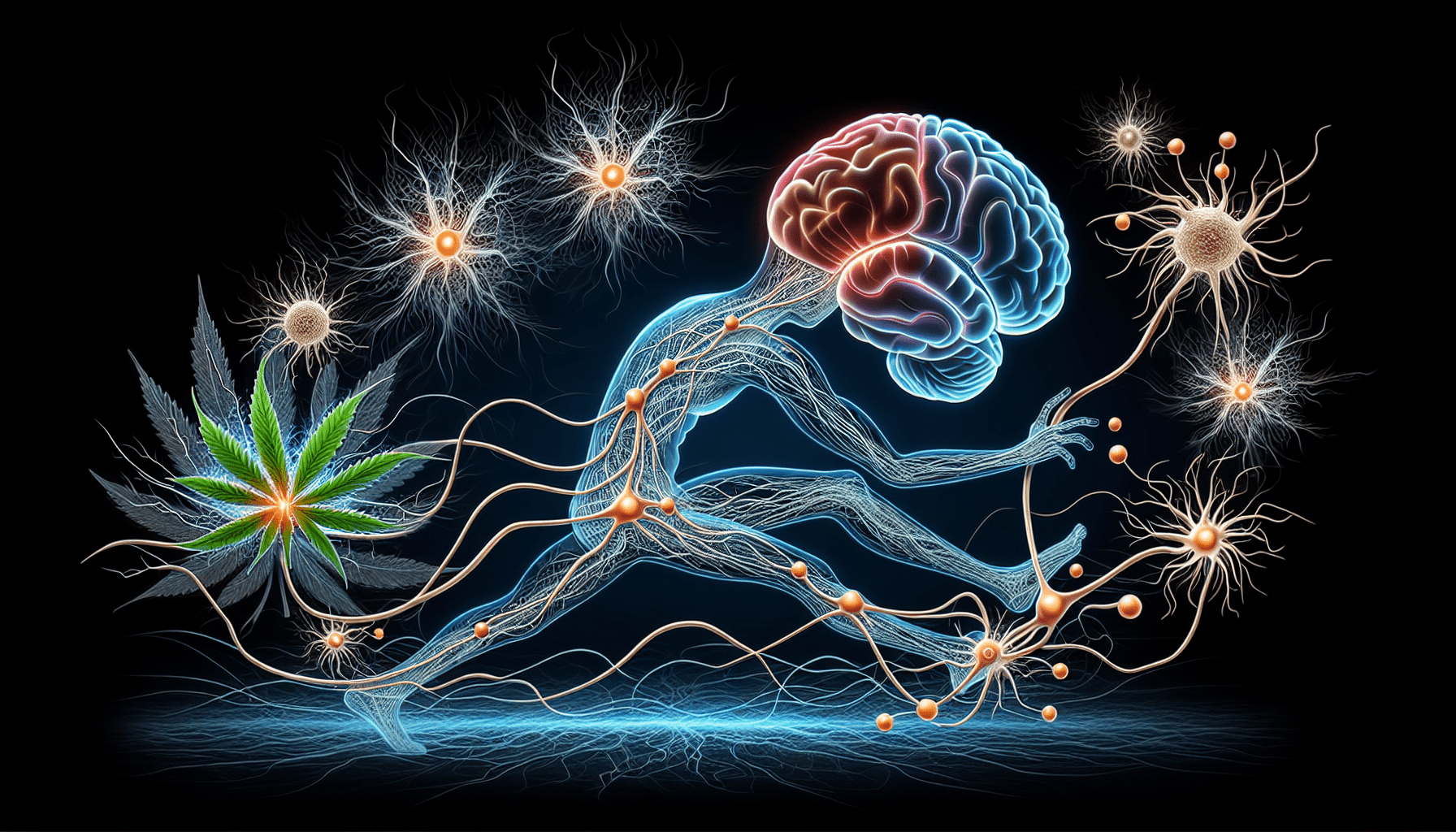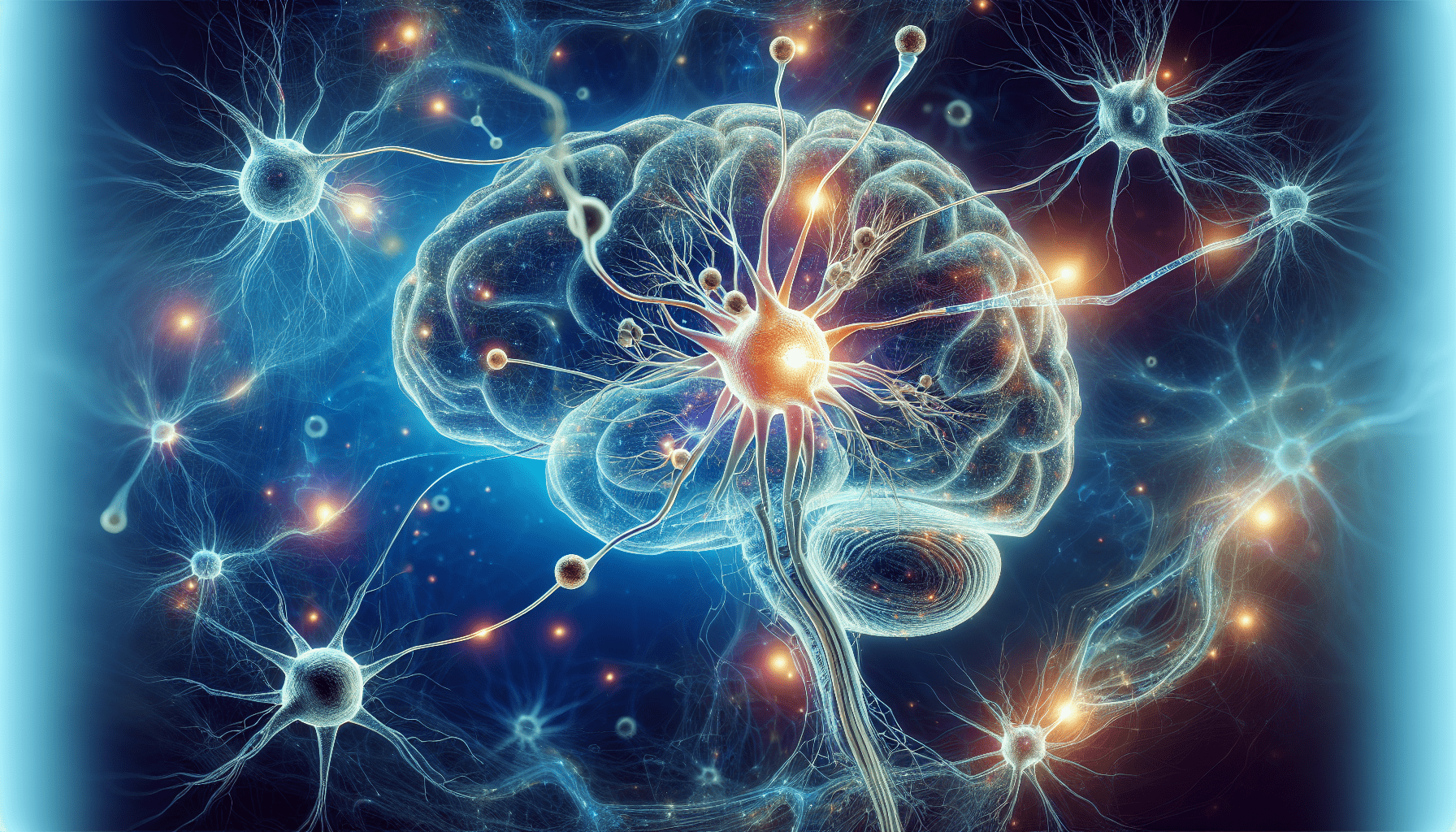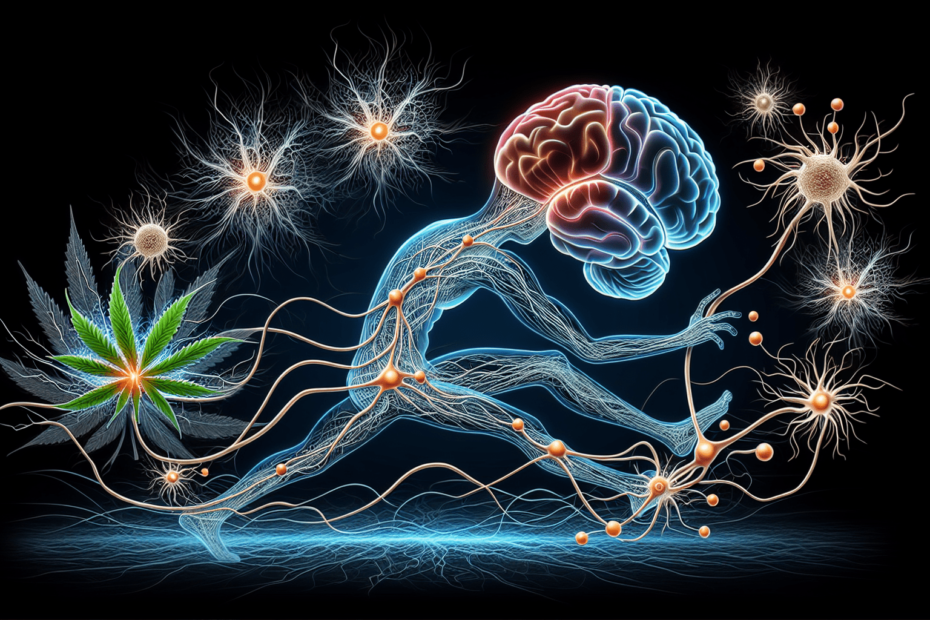In this insightful article, we will explore the fascinating realm of how CBD interacts with the central nervous system. From its potential therapeutic effects to the scientific mechanisms behind its action, we will delve into the intricate relationship between CBD and our body’s control center. So, sit back, relax, and get ready to uncover the mysteries of this remarkable compound’s interaction with the central nervous system.
Overview of CBD
What is CBD?
CBD, short for cannabidiol, is a natural compound found in the marijuana plant. Unlike its cousin, THC, CBD does not cause a psychoactive high. It is widely used for its potential therapeutic benefits and has gained popularity in recent years.
Methods of CBD Consumption
CBD can be consumed in various ways to suit individual preferences and needs. Some common methods include oral ingestion through capsules or edibles, sublingual administration by placing oil drops under the tongue, and topical application in the form of creams or lotions. Vaping and smoking CBD-infused products are also popular methods.
Benefits of CBD
CBD has been hailed for its potential to provide relief from various health issues. It is known to have anti-inflammatory properties, making it beneficial for individuals dealing with chronic pain and inflammation. Additionally, CBD may have antidepressant and anxiolytic effects, providing a potential alternative for those struggling with anxiety and depression. CBD has also shown promise in treating epilepsy, multiple sclerosis, and other neurological disorders.
Understanding the Central Nervous System
Role of the Central Nervous System
The central nervous system (CNS) plays a crucial role in coordinating and controlling bodily functions. It consists of the brain and the spinal cord, which work together to process and transmit information throughout the body. The CNS is responsible for regulating movement, sensory perception, cognition, and emotions.
Components of the Central Nervous System
The CNS is composed of two main components: the brain and the spinal cord. The brain serves as the body’s control center, interpreting and responding to sensory information. It is divided into different regions, each responsible for specific functions such as memory, learning, and motor control. The spinal cord, on the other hand, facilitates communication between the brain and the rest of the body, allowing for sensory and motor signals to be transmitted.

CBD and the Central Nervous System
Interaction Mechanisms
CBD interacts with the central nervous system through various mechanisms. One of the primary ways is by modulating the activity of neurotransmitters, which are chemical messengers that transmit signals between nerve cells. CBD can also directly influence receptors in the brain and spinal cord, altering their functioning and resulting in therapeutic effects.
Effects of CBD on Neurotransmitters
Studies have shown that CBD can affect the levels of neurotransmitters in the central nervous system. For example, it has been found to increase the levels of anandamide, a neurotransmitter involved in pain perception, mood regulation, and sleep. By modulating neurotransmitter levels, CBD may help alleviate symptoms associated with conditions such as chronic pain, anxiety, and depression.
CBD’s Impact on Receptors
CBD interacts with various receptors in the central nervous system, including cannabinoid receptors type 1 and type 2 (CB1 and CB2). CB1 receptors are primarily found in the brain, while CB2 receptors are predominantly located in immune cells. CBD can bind to these receptors and influence their activity, potentially leading to therapeutic effects on pain, inflammation, and immune function.
CBD’s Influence on Neuroinflammation
Neuroinflammation, characterized by inflammation in the central nervous system, has been implicated in various neurological disorders. Studies have shown that CBD has anti-inflammatory properties and can attenuate neuroinflammation. By reducing inflammation in the CNS, CBD may contribute to the treatment and management of conditions such as Alzheimer’s disease, multiple sclerosis, and Parkinson’s disease.
Endocannabinoid System and CBD
Introduction to the Endocannabinoid System
The endocannabinoid system (ECS) is a complex network of receptors, enzymes, and endogenous cannabinoids (endocannabinoids) that plays a crucial role in maintaining homeostasis in the body. The ECS is involved in regulating various physiological processes, including mood, appetite, pain sensation, and immune function.
Interaction Between CBD and the Endocannabinoid System
CBD interacts with the endocannabinoid system by influencing the activity of its receptors and enzymes. While CBD does not directly bind to CB1 or CB2 receptors, it can modulate their functioning, leading to various therapeutic effects. CBD also affects the levels of endocannabinoids in the body, helping to restore balance and promote overall well-being.
Modulation of Neurotransmission by CBD
CBD’s interaction with the endocannabinoid system can modulate neurotransmission in the central nervous system. It has been shown to inhibit the reuptake of certain neurotransmitters, increasing their availability in the synaptic cleft and enhancing their effects. By modulating neurotransmission, CBD has the potential to impact various aspects of brain function, including mood, cognition, and pain perception.
CBD’s Role in Restoring Homeostasis
The endocannabinoid system is responsible for maintaining balance and stability in the body, a state known as homeostasis. CBD’s interaction with the ECS can help restore homeostasis by regulating various physiological processes. This may explain why CBD has shown promise in treating a wide range of conditions, from epilepsy and multiple sclerosis to anxiety and depression.

Neuroprotective Properties of CBD
CBD and Neurodegenerative Diseases
Neurodegenerative diseases, such as Alzheimer’s and Parkinson’s, are characterized by the progressive loss of neurons in the central nervous system. CBD has shown neuroprotective properties and may help slow down the progression of these diseases. It acts as an antioxidant, reducing oxidative stress and inflammation in the brain, and it also promotes the growth and survival of neurons.
Anti-Inflammatory Effects of CBD
Inflammation is a common underlying factor in many neurological disorders. CBD’s anti-inflammatory properties can help reduce inflammation in the central nervous system, potentially providing relief from symptoms and slowing disease progression. By targeting and reducing neuroinflammation, CBD may offer neuroprotective effects and alleviate symptoms associated with conditions like multiple sclerosis and Alzheimer’s disease.
Neurogenesis and CBD
Neurogenesis refers to the process of generating new neurons in the brain. CBD has been found to promote neurogenesis in certain regions of the brain, such as the hippocampus, which is involved in memory and learning. By stimulating the growth of new neurons, CBD may enhance cognitive function and potentially have a positive impact on conditions like Alzheimer’s disease.
CBD’s Role in Pain Management
Chronic pain is a common symptom associated with various central nervous system disorders. CBD has been recognized for its analgesic properties, providing potential relief from pain. It modulates the activity of pain receptors in the central nervous system, reducing pain perception and inflammation. CBD’s effects on pain management make it a promising option for individuals dealing with conditions like multiple sclerosis and neuropathic pain.
CBD’s Potential in Treating Central Nervous System Disorders
Epilepsy and CBD
One of the most well-known uses of CBD is in the treatment of epilepsy. CBD has been shown to have anticonvulsant properties and can help reduce the frequency and severity of seizures in individuals with certain forms of epilepsy. In fact, a CBD-based medication called Epidiolex has been approved by the FDA for the treatment of certain types of epilepsy.
Multiple Sclerosis and CBD
Multiple sclerosis (MS) is a chronic autoimmune disease that affects the central nervous system. CBD has shown promise in managing symptoms associated with MS, such as pain, muscle spasticity, and fatigue. It can help alleviate inflammation, improve mobility, and enhance overall quality of life in individuals with MS.
Parkinson’s Disease and CBD
Parkinson’s disease is a neurodegenerative disorder characterized by the progressive deterioration of dopamine-producing neurons in the brain. CBD has been studied for its potential neuroprotective and anti-inflammatory effects in Parkinson’s disease. It can help reduce motor symptoms, improve sleep quality, and alleviate anxiety and depression commonly associated with the condition.
CBD for Anxiety and Depression
Anxiety and depression are mental health disorders that can significantly impact an individual’s quality of life. CBD has gained attention for its potential antidepressant and anxiolytic effects. It interacts with serotonin receptors in the brain, regulating mood and emotions. CBD may offer a natural alternative for individuals seeking relief from anxiety and depression, without the side effects often associated with traditional medications.

Safety and Side Effects of CBD
General Safety of CBD
CBD is generally considered safe for most individuals when used properly. It is well-tolerated and has a low risk of toxicity. However, it’s essential to source CBD products from reputable manufacturers and ensure they undergo third-party lab testing to guarantee purity and quality. Consulting with a healthcare professional is recommended before starting CBD use, especially if you have underlying health conditions or are taking other medications.
Possible Side Effects of CBD
While CBD is generally well-tolerated, some individuals may experience side effects. These can include drowsiness, dry mouth, diarrhea, and changes in appetite. The intensity and frequency of side effects may vary depending on the individual and the dosage used. Starting with a low dose and gradually increasing can help minimize the likelihood of experiencing adverse effects.
Interactions with Other Medications
CBD has the potential to interact with certain medications, primarily those metabolized by the liver’s cytochrome P450 enzymes. CBD can inhibit or enhance the activity of these enzymes, which may affect the metabolism and efficacy of other medications. It is crucial to consult with a healthcare professional before combining CBD with other medications to ensure safety and prevent any potential interactions.
CBD Legal Status
The legal status of CBD varies by country and jurisdiction. In some regions, CBD is legal, while in others, it may be restricted or available only with a prescription. It’s important to familiarize yourself with the specific laws and regulations surrounding CBD in your area to ensure compliance.
Research and Studies on CBD and the Central Nervous System
Clinical Trials
Numerous clinical trials have been conducted to explore the potential therapeutic benefits of CBD on the central nervous system. These studies have focused on various neurological disorders, including epilepsy, multiple sclerosis, and Parkinson’s disease. Clinical trials provide valuable scientific evidence on the safety and efficacy of CBD in specific conditions, helping to inform medical practice and treatment guidelines.
Animal Studies
Animal studies have also played a significant role in understanding CBD’s effects on the central nervous system. These studies often involve rodents or non-human primates and provide valuable insights into CBD’s mechanisms of action, optimal dosages, and potential side effects. While animal studies cannot directly translate to human responses, they contribute to the growing body of evidence supporting CBD’s therapeutic potential.
Current Research Areas
CBD research is an active and evolving field, with ongoing studies exploring various aspects of its interaction with the central nervous system. Current research focuses on areas such as the neuroprotective effects of CBD in neurodegenerative diseases, its potential for pain management, and the role of CBD in psychiatric disorders like anxiety and depression. Continued research efforts aim to further elucidate CBD’s mechanisms of action and potential therapeutic applications.

Considerations for CBD Use
Consulting with a Healthcare Professional
Before incorporating CBD into your regimen, it is crucial to consult with a healthcare professional. They can provide personalized advice, taking into consideration your specific health needs and any existing medications. A healthcare professional can help determine the appropriate dosage, potential interactions, and monitor your response to CBD to ensure optimal safety and efficacy.
Finding Reliable CBD Products
With the growing popularity of CBD, it is essential to source products from reputable manufacturers. Look for companies that prioritize quality and transparency, such as those that provide third-party lab testing results. Reliable CBD products should clearly state the CBD content, list ingredients, and provide dosage guidelines. Reading customer reviews and seeking recommendations from trusted sources can also help in finding reliable CBD products.
Proper Dosage and Administration
Determining the appropriate CBD dosage can be challenging, as it varies depending on factors such as body weight, individual metabolism, and the severity of the condition being treated. Starting with a low dose and gradually increasing can help find the optimal dosage for your needs. It is important to follow dosage guidelines provided by the manufacturer or healthcare professional.
Monitoring Personal Response to CBD
Everyone’s response to CBD is different, and it may take time to find the right dosage and regimen for your needs. It is vital to monitor how your body responds to CBD, both in terms of therapeutic effects and any potential side effects. Keeping a journal or diary can be helpful in tracking your symptoms, dosage, and overall well-being.
Conclusion
In conclusion, CBD’s interaction with the central nervous system holds great promise for various health conditions. By modulating neurotransmission, influencing receptors, and reducing neuroinflammation, CBD can potentially provide therapeutic benefits for individuals dealing with pain, neurological disorders, and mental health conditions. Extensive research and clinical trials continue to advance our understanding of CBD’s potential, with ongoing studies exploring its effects on the central nervous system. As always, it is important to consult with a healthcare professional, source reliable CBD products, and monitor personal response to CBD for optimal safety and efficacy. With further research and continued scientific advancements, the future of CBD’s potential in treating central nervous system disorders looks bright.

